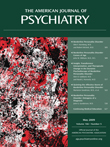Chest Pain in a Young Patient Treated With Prazosin for PTSD
To The Editor: Prazosin is an a-1-adrenergic receptor antagonist that has been found to be effective in treating sleep-related posttraumatic stress disorder (PTSD) symptoms in three small parallel-group placebo-controlled studies (1 , 2) . We report the case of a PTSD patient who developed chest pain following treatment with low-dose prazosin. Although not approved by the Food and Drug Administration, prazosin seemed to be a reasonable choice because of the patient’s prominent sleep difficulties.
“Mr. A” was a 25-year-old male veteran who developed PTSD after returning from deployment in Iraq. He complained of disturbed sleep, with multiple awakenings three to four nights per week from trauma-related nightmares, intrusive memories, and flashbacks. He was not taking any medications. Different pharmacological options for PTSD were discussed with the patient, including their benefits and risks.
Prazosin was started at 1 mg at night, with a plan to increase the dose to 2 mg on days 4 to 7 (1 – 2) . The patient developed acute, intermittent, left-sided chest pain on the third day of treatment with prazosin, which he described as being “sharp like a knife” and associated with exertion. Mr. A also complained of dizziness and muscle twitching.
The patient’s vital signs were within normal limits. He had no personal or family history of cardiac problems and no risk factors for cardiac disease, except he smoked half a pack of cigarettes per day. Physical examination found a grade 2/6 systolic murmur. Echocardiogram showed “trace, insignificant valvular regurgitation,” which was considered an unlikely cause of the chest pain. Prazosin was discontinued, and the pain subsided and resolved completely in 1 week.
The three controlled studies of prazosin in the treatment of PTSD patients (N=63) did not report any subjects with chest pain. The mean doses were 10 mg, 13 mg, and 3.1 mg (in a civilian trauma population), respectively. However, Medline Plus (3) lists chest pain as an adverse effect of prazosin. The incidence of patients who experience chest pain while being treated with prazosin could not be determined, although angina pectoris is listed as occurring in <1% of cases. In the present case, the temporal association of chest pain with the use of prazosin and the absence of a personal or family history of cardiac disease suggest a causal role of prazosin. However, the patient’s cardiac examination failed to demonstrate significant vulnerabilities, and thus it appeared that his symptom was a nonspecific chest pain. The pain apparently was not mediated by hypotension, which is a common side effect, especially in older patients with cardiovascular risk. In one review of long-term administration of prazosin (4) , 30% of patients complained of dizziness, orthostatic hypotension, and/or palpitations. Hypotension can occur after the first dose, which is why the drug was started at only 1 mg in the three PTSD studies (1 , 2) . Clinicians prescribing prazosin for the treatment of PTSD should be aware of the potential side effect of chest pain and its differential diagnosis.
1. Raskind MA, Peskind ER, Hoff DJ, Hart KL, Holmes HA, Warren D, Shofer J, O’Connell J, Taylor F, Gross C, Rohde K, McFall ME: A parallel group placebo controlled study of prazosin for trauma nightmares and sleep disturbance in combat veterans with post-traumatic stress disorder. Biol Psychiatry 2007; 61:928–934Google Scholar
2. Taylor FB, Martin P, Thompson C, Williams J, Mellman TA, Gross C, Peskind ER, Raskind MA: Prazosin effects on objective sleep measures and clinical symptoms in civilian trauma posttraumatic stress disorder: a placebo-controlled study. Biol Psychiatry 2008; 63:629–632Google Scholar
3. Medline Plus: www.nlm.nih.gov/medlineplus/druginfo/medmaster. Accessed Oct 2008Google Scholar
4. Bouffioux CR, Penders L: Alpha-blockers in the treatment of benign prostatic hypertrophy: physiological basis and review of the problem. Eur Urol 1984; 10:306–310Google Scholar



